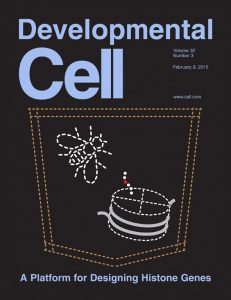Epigenetic control of genome replication and function
This project is a collaborative effort with the labs of Greg Matera, Brian Strahl, and Dan McKay
Lab members on this project:
- Megan Butler – research technician
- Aaron Crain – GMB graduate student
- Christina Hill – research scientist
- Jeanne-Marie McPherson – GMB graduate student
- Markus Nevil – postdoctoral fellow
- Priscila Santa Rosa – graduate student
 Epigenetics is the study of how different states of phenotypic expression are propagated independently of DNA sequence. The development of hundreds of cell types in an adult organism from a single cell is known to require epigenetic processes. Covalent post-translational modifications (PTMs) of histone proteins are widely believed to be carriers of epigenetic information that is passed from one cell generation to the next. However, this premise has not been rigorously tested in animals. Histone PTMs play central roles in the regulation of transcription, DNA replication and DNA damage repair, but in animal cells these roles have been inferred from genetic analyses of the enzymes that catalyze the PTM (writers) and the proteins that bind to and mediate the effect of the PTM (readers) rather than from the modified histone itself. The only unambiguous way to study the biological function of a specific histone PTM is to change the acceptor residue to an amino acid that cannot be appropriately modified, and then engineer a complete gene replacement to carry out phenotypic analyses. We have developed an experimental platform in Drosophila to directly test whether specific histone residues mediate epigenetic inheritance and control cell fate and proliferation in multi-cellular eukaryotes. We use a transgenic strategy to replace the entire histone multi-gene family with engineered gene clusters that express specific histone mutations. Importantly, our genetic strategy permits both tissue specific and temporal analysis of any histone modification or combination of modifications. We are creating a sustainable and expandable resource for the study of epigenetic phenomena by providing the means to directly evaluate the contributions of specific histone residues to epigenetic regulation during animal development. Because disruption of evolutionarily conserved histone PTMs is thought to cause or contribute to many human diseases, this research will directly impact human health.
Epigenetics is the study of how different states of phenotypic expression are propagated independently of DNA sequence. The development of hundreds of cell types in an adult organism from a single cell is known to require epigenetic processes. Covalent post-translational modifications (PTMs) of histone proteins are widely believed to be carriers of epigenetic information that is passed from one cell generation to the next. However, this premise has not been rigorously tested in animals. Histone PTMs play central roles in the regulation of transcription, DNA replication and DNA damage repair, but in animal cells these roles have been inferred from genetic analyses of the enzymes that catalyze the PTM (writers) and the proteins that bind to and mediate the effect of the PTM (readers) rather than from the modified histone itself. The only unambiguous way to study the biological function of a specific histone PTM is to change the acceptor residue to an amino acid that cannot be appropriately modified, and then engineer a complete gene replacement to carry out phenotypic analyses. We have developed an experimental platform in Drosophila to directly test whether specific histone residues mediate epigenetic inheritance and control cell fate and proliferation in multi-cellular eukaryotes. We use a transgenic strategy to replace the entire histone multi-gene family with engineered gene clusters that express specific histone mutations. Importantly, our genetic strategy permits both tissue specific and temporal analysis of any histone modification or combination of modifications. We are creating a sustainable and expandable resource for the study of epigenetic phenomena by providing the means to directly evaluate the contributions of specific histone residues to epigenetic regulation during animal development. Because disruption of evolutionarily conserved histone PTMs is thought to cause or contribute to many human diseases, this research will directly impact human health.